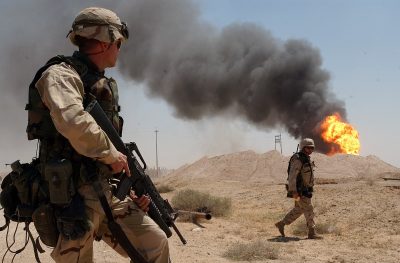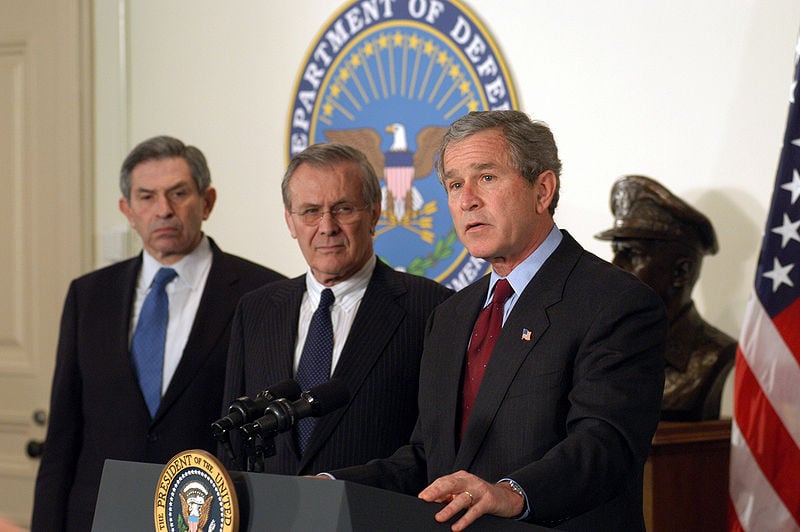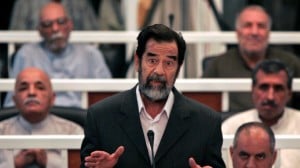Growing Discontent in Iraq 20 Years After the US Invasion

All Global Research articles can be read in 51 languages by activating the Translate Website button below the author’s name.
To receive Global Research’s Daily Newsletter (selected articles), click here.
Click the share button above to email/forward this article to your friends and colleagues. Follow us on Instagram and Twitter and subscribe to our Telegram Channel. Feel free to repost and share widely Global Research articles.
***
Following the 9/11 terrorist attacks in the United States which occurred over 20 years ago, democracy within the country eroded further. A week after the terrorist assaults, on 18 September 2001 president George W. Bush signed into law the Authorization for Use of Military Force, which was promptly approved by the US Congress. This legislation granted president Bush the power to use the “necessary and appropriate force” against America’s perceived enemies.
Bush said his government “will not only deal with those who dare attack America, we will deal with those who harbor them and feed them and house them”. On 7 October 2001 the US, with the participation of Britain, Canada and Australia, started bombing Afghanistan, and US ground forces were landing in Afghanistan from 18 October.
There was a period of only 26 days, between the 9/11 attacks and when the US bombing of Afghanistan commenced on 7 October. It takes significantly longer than 26 days to prepare a military offensive against a sizable country like Afghanistan. By 26 September, just 15 days after 9/11, operatives from the CIA were present on Afghan soil stoking unrest. (1)
Niaz Naik, an experienced diplomat and Pakistan’s former Foreign Secretary (1982–86), revealed he had been told by senior American officials in mid-July 2001 that Washington, by then, had decided to take military action against Afghanistan (2). We can assume the actual planning of a military campaign in Afghanistan would have preceded July 2001 by some weeks or months, very soon after Bush entered office on 20 January 2001.
Bush signed into law the Patriot Act on 26 October 2001, which enlarged the government’s powers for the electronic surveillance of citizens by the US National Security Agency (NSA); the Patriot Act further established the new crime of domestic terrorism in broad terms, relating to any act of civil disobedience regardless of the political motivation. This was a violation of the US Constitution and which undermined the country’s domestic legal structure.
Nearly a year later, Bush declared the National Security Strategy of the United States on 17 September 2002, in which he stated the battle against the anti-American insurgency could not be won by defensive methods; and that Washington had the right to launch preventive wars across the world unilaterally, including the option of using nuclear weapons against non-nuclear nations.
Bush further implemented his foreign policy goals, by launching a US military offensive against Iraq beginning on 20 March 2003. Bush’s government was supported in this unprovoked attack by the British, Australians and Poles. Washington’s NATO allies France and Germany refused to partake in it.
However, Angela Merkel – the then Leader of the Opposition in Berlin – provided strong public support for the US-led invasion of Iraq, despite doubts from within her own party, the Christian Democratic Union. Shortly before the attack on Iraq began Merkel said war was “unavoidable” and “Not acting would have caused more damage”. Merkel lied about this in 2016 when she said, “I never support war. I did not support the war in Iraq. I was very upset that it was not possible to come up with a common position between the Europeans and the United States”. (3)
In June 2003 the US Deputy Secretary of Defense, Paul Wolfowitz, was asked during a trip to Singapore why the Americans had not chosen a military solution regarding North Korea, as with Iraq. Wolfowitz replied, “Let’s look at it simply. The most important difference between North Korea and Iraq is that economically we just had no choice in Iraq. The country swims on a sea of oil”. (4)
Moreover, North Korea has for many years boasted a large army and a formidable arsenal of weapons, which may well be the main reason the US has not attacked North Korea since the Korean War ended in 1953. For whatever problems there are within North Korean society, Pyongyang’s policy of building a strong military has been a shrewd undertaking. In the event of war between the US and North Korea, the North Koreans would be left with little alternative but to direct the full weight of their military power against South Korea, as the Americans are aware of. Washington had no such issues with Iraq, the country was mostly defenceless.
A German geologist who explored Iraq and the surrounding area, before the First World War, estimated the region contained the “largest undeveloped resources” of oil on earth, and he predicted “the power that controls the oil lands of Persia [Iran] and Mesopotamia [Iraq] will control the source of supply of the majority liquid fuel of the future”. (5)
After World War I, the British seized the Iraqi capital Baghdad, and Basra in the south of the country. The French took control of northern Iraq, Syria and Lebanon. The Kurdish population were kept in a separate region under British rule, and when they revolted the Colonial Secretary Winston Churchill insisted, “I do not understand this squeamishness about the use of gas. I am strongly in favour of using poisoned gas against uncivilised tribes”. (6)
The US has for decades been more reliant on oil consumption than any other country, and a key foreign policy aim is to safeguard raw materials to sustain the economy and American “way of life”. The American lifestyle, to provide an example, is massively dependent on petroleum-run automobiles. There are currently just over 290 million vehicles in the US for a population of around 335 million (7), meaning there is nearly a vehicle for every person in the country, and less than 1% of these are electric models. China is considered the world’s biggest manufacturing power, but there is less than 1 vehicle for every 4 people in China, 319 million vehicles for a population of 1.4 billion. (8)
Bush’s vice-president Dick Cheney acknowledged that the Gulf War (1990–91) was concerned, in part, with maintaining Washington’s access to the Persian Gulf’s natural resources. On 28 May 2003 Cheney’s colleague, Wolfowitz, said the pretext of weapons of mass destruction (WMDs) was chosen for “bureaucratic reasons” by Washington to justify the invasion of Iraq, because it was the only topic which everyone could agree on as an excuse for intervening militarily in the country. (9)
Iraq’s leader Saddam Hussein must have been irritated, when he was accused of possessing deadly weapons of which he had none. His irritation would have grown, as he was incorrectly blamed for having some sort of involvement in the 9/11 attacks, and of having ties to Al Qaeda.
Rubens Barbosa, former Brazilian ambassador to the US (1999–2004), wrote in his memoirs that “the decision to attack Iraq had been taken before the September 11 attacks” (10). The BBC show ‘Newsnight’ conceded in March 2005 that the Bush administration had developed plans for invading Iraq months prior to 9/11, and political infighting had been taking place between the White House’s neo-conservatives and American oil firms, about how to exploit Iraq’s wealth. (11)
Bush and his British counterpart, Tony Blair, discussed what to do with the Iraqi oil assets before 2003. Blair’s government (1997–2007) was being lobbied by British oil companies, who wanted assurances they would be able to access Iraq’s petroleum reserves after Saddam Hussein was overthrown (12). Fossil fuel corporations from America and Europe, including Chevron and Shell, had already developed projects pertaining to Iraq before the invasion commenced.
Afterward, geologists from Western multinational firms analysed the unexplored desert regions of western and southern Iraq. The US Department of Energy surmised that the areas in question could hold between 45 billion to 100 billion barrels of oil (13). Bush, who had an extensive history of working in the US oil industry, was also deeply interested with ensuring access to raw materials. Bush said in his 2006 State of the Union address, “America is addicted to oil which is often imported from unstable parts of the world”.
Saddam had proven increasingly unreliable in his relationship with the Anglo-Americans. He started to replace the dollar by the euro as the currency for oil transactions, and he had been in negotiations for contracts with foreign energy companies such as Total from France. This insubordination on Saddam’s part was a major factor in his demise.
When he was a more pliable client, Saddam had been granted considerable support from Washington, including military aid, such as during the Iran-Iraq War (1980–88). John Kelly, the US Assistant Secretary of State for Near Eastern Affairs, visited Baghdad shortly after the conclusion of the Iran-Iraq War and told Saddam, “You are a force for moderation in the region, and the United States wants to broaden her relationship with Iraq”. (14)
When evidence was provided by human rights activists, that Saddam’s forces had used nerve gas and mustard gas against Iranian soldiers and Kurdish civilians, the US State Department would not condemn him. In the early years of Saddam’s reign the Americans viewed him as a bulwark against Iran, a country which had gained independence from Western imperialism with the 1979 revolution.
President Bush may have felt he was going to introduce a “free and open society” to Iraq by removing Saddam, however misguided such a view was. Yet many Iraqis believe their lives were better under Saddam, rather than what followed from 2003. In a survey conducted in February 2023, almost 20 years after the US invasion began, 59% of Iraqi respondents said the situation in their country is worse in 2023 compared to life under Saddam, with 40% saying it is better; 66% of Iraqis said the invasion had negative consequences for them. (15)
Following Saddam’s taking of power in 1979, regardless of some of his notorious actions, he had managed to maintain the structure of the Iraqi state. He was not ultimately responsible for the extremely harsh financial measures which the Americans and British had enacted against Iraq, in the decade before 2003.
Oil was Iraq’s most important commodity. It had amounted to 90% of government revenues and 58% of the country’s Gross Domestic Product (GDP). During the opening phase of Saddam’s rule, he used much of the profits gathered from the state’s oil production in order “to modernise the civilian infrastructure, building first-rate hospitals, schools and universities”, journalist John Pilger wrote (16). Pilger noted too that Saddam undertook these policies more than any other Arab leader at the time.
Though Iraq was not a haven under Saddam’s regime, he had successfully created a fairly large and well-educated middle class. The adult literacy rate in Iraq, those who could read and write, was among the highest in the world under Saddam at about 95%. The adult literacy rate has since dropped to just under 80% (17). Whereas in 1990 the average daily calorie intake for an Iraqi citizen amounted to over 3,000 calories, near the end of the US occupation of Iraq in 2010 this had dropped to 2,580 calories. (18)
Clearly, living standards in Iraq deteriorated since Saddam’s toppling by the Americans, and sectarian violence greatly worsened from 2003 between the nation’s Shia and Sunni communities. These problems were also less severe during Saddam’s reign, when Iraq had been a more stable country.
*
Note to readers: Please click the share button above. Follow us on Instagram and Twitter and subscribe to our Telegram Channel. Feel free to repost and share widely Global Research articles.
Shane Quinn obtained an honors journalism degree and he writes primarily on foreign affairs and historical subjects. He is a Research Associate of the Centre for Research on Globalization (CRG).
Notes
1 “Afghanistan War, 2001-2014”, Britannica, Last updated 15 May 2023
2 “US ‘planned attack on Taleban'”, BBC, 18 September 2001
3 “Merkel speaks; DW checks the facts”, Deutsche Welle, 30 July 2016
4 “Iraq in the DNA of imperialism”, Global Policy Forum, 28 October 2004
5 Luiz Alberto Moniz Bandeira, The Second Cold War: Geopolitics and the Strategic Dimensions of the USA (Springer; 1st ed., 23 June 2017) p. 80
6 John Pilger, The New Rulers Of The World (Verso Books, 20 February 2003) p. 68
7 “How many cars are in the US? [2023]”, Zippia, 30 January 2023
8 “Spending our way to prosperity”, China US Focus, 24 March 2023
9 Bandeira, The Second Cold War, p. 82
10 Ibid., p. 83
11 “Secret US plans for Iraq’s oil”, BBC, 17 March 2005
12 Bandeira, The Second Cold War, p. 83
13 “US says Iraq needs to do more to develop oil fields”, Reuters, 21 July 2009
14 Pilger, The New Rulers Of The World, p. 69
15 “How Iraqis view life after the fall of Saddam – Twenty years ago and today”, Fikra Forum, 19 March 2023
16 Pilger, The New Rulers Of The World, p. 95
17 “Iraq population (2023)”, Countrymeters.info, Literacy
18 “Food deprivation in Iraq”, ReliefWeb, 19 August 2010
Featured image: U.S. Army guarding Rumaylah Oil Fields, Southern Iraq, 2003. Photo credit: U.S. Navy via WikiMedia Commons



